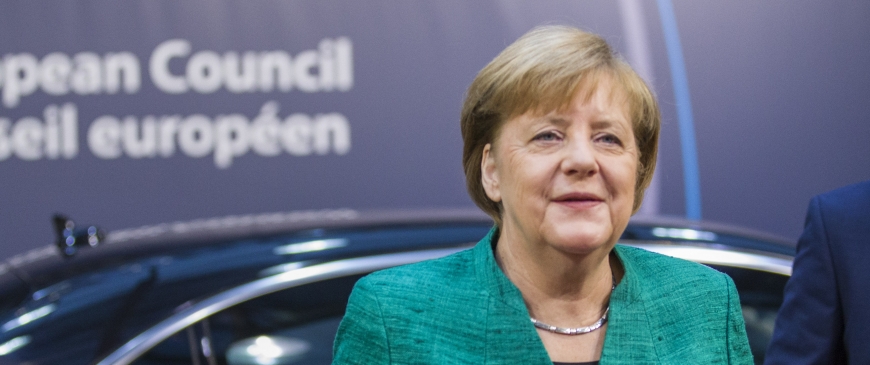
The end of little Germany?
At long last, Germany is ready to swear in a new government. After five months of political wrangling, the Social Democrats (SPD) and the Christian Democratic Union – together with the CDU’s Bavarian sister party, the Christian Social Union – have formed a government coalition. But in the process of reaching that agreement, something has shifted in German political debate.
Germany has long enjoyed the luxury of pretending to be something it is not: a small country. At the time of the election last year, there was hardly any public debate about the European Union and Germany’s role in it. Chancellor Angela Merkel’s then-comfortable lead in opinion polls confirmed her instinct that German voters did not want to be bothered with discussions about Europe’s future. And, despite being the former president of the European Parliament, then-SPD leader Martin Schulz also focused almost entirely on domestic issues.
But the election of US President Donald Trump, the reform agenda of French President Emmanuel Macron, and, to a lesser extent, the United Kingdom’s vote to leave the EU, have focused minds across Germany. If Europe is to meet its many challenges, Germany needs to question some of its longstanding assumptions. It needs a clear European agenda, one that dispenses with small-nation thinking.
To be sure, Germany’s historical narratives and political preferences limit the options available to any government. But there are still realistic steps that the incoming German government can take to serve the European and global good. Will the new coalition be up to the task?
The Europe chapter in the coalition agreement between CDU/CSU and the SPD has been framed in Germany as an answer to Macron’s eurozone reform proposals. But those who were hoping for a fundamental change in economic policy will likely be disappointed. The new government might talk about restarting the EU’s Franco-German engine of reform, but it is unlikely to support proposals for debt mutualization or the creation of a sizeable common budget.
But it can and should pursue other measures. Germany could accept – and even promote – the idea that fiscal policy should be more counter-cyclical at the national level. It should also stop dragging its feet on the eurozone banking union and make the capital markets union a high political priority. It could make a bold offer on European deposit insurance and a common fiscal backstop for the Eurozone’s Single Resolution Fund, which steps in when banks collapse and are wound up. It could tie that offer to a thorough clean-up of the European banking system, especially in Italy, and to tough rules on creditor bail-ins.
Germany must also tackle its large savings surplus, which is unbefitting Europe’s largest economy. To boost consumption, low-income earners need to be relieved of their excessively high tax burden. Germany’s labor-market institutions leave many service workers without much bargaining power or protection, thereby creating one of the largest low-wage sectors in Europe. German savers could also do with a low-fee public wealth fund, which could boost equity investments both in Germany and across borders, while reducing German demand for international safe assets.
With the finance ministry in SPD hands, a greater emphasis on public investment, rather than tax cuts and further reductions in public debt, has also become a possibility. Germans are beginning to grow tired of the decade-long ideology-driven pursuit of lower deficits. The country’s constitutional fiscal rule, known as the debt brake, does allow for higher public spending. Slight economic overheating as a result of higher private and public investment would help boost wages and import demand, which might help reduce Germany’s current-account surplus.
The new German government should also develop a new trade policy that recognizes and is willing to use the country’s economic clout, and that of the EU, more strategically. The increasingly protectionist tone of the Trump administration presents a perfect opportunity for Germany to step into the breach. The US will soon impose tariffs on all steel and aluminum imports, and this requires a firm European response.
It is notable that the German debate about the US-EU Transatlantic Trade and Investment Partnership was focused primarily on consumer rights and protecting domestic regulations and standards. But narrow economic goals such as these, to which a small country would give priority, no longer suffice for today’s German neo-hegemon. The same is true of overly optimistic support for a form of trade multilateralism that has largely run its course.
Instead, the incoming German government needs to develop a trade policy that supports economic reforms and social standards, while promoting market economics and the rule of law in its neighborhood. Germany could also be doing more to push the rest of Europe to be more forceful at the World Trade Organization on social rights, environmental protection, fair taxation, and improved political standards.
These proposals require German politicians to shift the debate. As the eurozone’s dominant country, Germany needs to make sure that the bloc benefits all of its members and is a stabilizing force in the world economy. Germany must finally start thinking of itself as the major economic player it is, and behave accordingly – preferably before new ministers settle into old routines.
Sophia Besch is a research fellow at the Center for European Reform.
